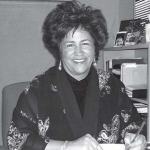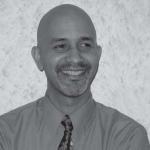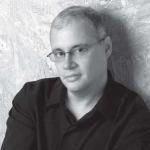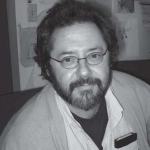Latinos Speak from Affrilachia: A Selection from PLUCK! The Journal of Affrilachian Arts and Culture
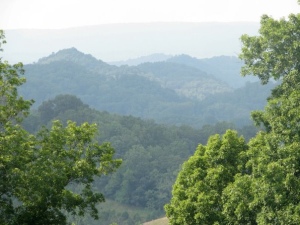
For five months, at the request of and via the introduction of Frank X Walker, editor of PLUCK! The Journal of Affrilachian Arts and Culture, four writers shared stories of food, land, home, race, sexuality and writing. In doing so, they illuminated the experience of being Latino in the United States and in Appalachia specifically. Their conversation is about more than race; it goes beyond being Latino, Cubana, being dark-skinned, light skinned or biracial. They open up only on the promise that kinship can be found and new friendships nurtured. In the shadows of Affrilachia: Latinos Speak.
Participants in a five-month e-mail dialogue in 2008 included: Marta Maria Miranda, Rane Arroyo, Ricardo Nazario Colon and Scott Lucero.
—– Original Message —–
Rane, Marta, Scott, Ricardo,
I’ve got this crazy idea to publish a “conversation” between Latinos in the region. Might you be interested in corresponding with each other and letting us publish excerpts from your conversation. You guys get to drive the topics. I’ll only introduce you to each other or better yet encourage you to discover each other electronically. I invite you to hit reply all and introduce yourselves by first responding to my only question: “Why or why doesn’t Latino fit who you are?” —Frank X Walker
From Marta Miranda:
I love this idea and am honored to engage in the conversation. A little about me, I am Afro-Caribbean, born in Pinar del Rio, Cuba, rural area. Grew up during the Cuban revolution, taught farmers how to read and write as part of the pioneer movement under Castro. I immigrated with my nuclear family to New Jersey where our sponsor family was [living]. So I went from rural Cuba—very similar to Appalachia—to west New York, Union City and Hoboken for 10 years, grew up fighting and loving with Nuyoricans, African Americans and Italians who wanted to protect their turf from the new arrivals. We fought hard for our little part of the street. I consider myself proud to have many influences that make me who I am.
I have blonde, blue-eyed family members and very dark-skinned family members with wonderfully nappy hair. My father was a chef, a militiaman, and a curandero; I am a lot like him. So like most of us, I don’t fit in a nice box. I practice the Yoruba religion mixed in with Catholicism—typical due to the colonization of Cuba by Spaniards and the resiliency of the African slaves to save their spiritual practices. I love the African drums, the rituals and how rich the African heritage is in the Cuban culture. I discovered Kentucky about twenty years ago and felt at home here more than anywhere else in the United States. Lived in Florida for ten years—too big and too much traffic; I hated it there. I bought a log cabin in a holler in Mt. Vernon (Kentucky) and lived there for ten years. I jokingly identify myself as Cubalachian, Cuban by birth and Appalachian by the grace of God.—Marta
From Ricardo Nazario Colon:
Marta,
I recently got into a dialogue with my students about Blackness and what Blackness is and it got me thinking about how I grew up
trigueño (the color of wheat) and as a child in Puerto Rico, Negro was reserved for those who could not escape la negritud. That herencia of ours which runs opposite of the United States’ “one drop rule.” In Puerto Rico, if you had a drop of anything else you could claim not to be Black. Do you remember all of that mestizo, mulato, Ladino, lobo, tornoatras Spanish stuff? It is funny that living in the U.S. I have been able to claim my African heritage, but many people look at me and say that I am not Black. ‘Cause here, African descent and Black are not the same. So I started thinking: what does being Black mean to a Puerto Rican? Is it a color, an experience, a particular ritual, a cultural aesthetic? It’s becoming easier to say that I am not Black because I don’t want to be militant anymore. I rather dismiss my relationship with those folks and move on. It’s hard to be of African descent, of Spanish descent and of Indian descent and honor all of that with all the love that is used to honor mothers. —Ricardo
From Rane Arroyo:
Ricardo,
It interests me that we have had opposite experiences about skin. Just by DNA I am light-skinned, but I lived in a family proud of its spectrum: blonde cousins and trigueño cousins. I was taught to value difference, but my parents came from humble roots and appreciation was one way to survive on very little. Our role models were always African American singers on TV—The Supremes, our Smokey Robinson and the Jackson Five. We didn’t have books in our house but I discovered James Baldwin in the library, the
man who yelled at me—get off your sorry ass. I had no clue that he was gay, or that I was.
I know most people do not think about race except as some kind of summary. But when I watched that song in the musical West Side Story, their America was mine too, not the one that was hard, but the one where you create spaces on rooftops to dance. It’s never an easy work. I fear the next generation may not understand how hard it was/is to survive with dignity. Yes, your survival is something to celebrate. I’ve been beaten up on the street before there was a term like “hate crime.” The people who hated me knew I was Latino and gay—a double whammy. Survival is underrated!
Your new friend, Rane
From Marta:
Ricardo,
I understand the trigueño piece, en cuba es lo mismo que en puerto rico. Here, lots of people claim to be White although there is maybe a drop or two of White. I get strange looks when I identify as biracial and claim mi herencia africana, que para mi es muy espiritual. I grew up with a santero papi and all the spirits he ever got, the ancestors, were Black slaves. I talk to my African American friends and they have no clue of the santos africanos, that heritage maybe is lost to them, it saves my alma, it reminds me that I am not homogenized and pasteurized. Mi papi me llemaba su negrita, which I loved. Gracias por recordarme de la necesidad de reclamar todo lo que somos, Marta
From Rane:
Puerto Ricans, as you all know, are on a spectrum—so my cousins were blond and some were/are very Black. But we were tied by love and blood. I grew up not understanding difference. I happen to be lighter, just by DNA, and then the school hired a coach to get rid of my accent. So people are often surprised and say, “But you don’t look…” But to me that is so damaging because I loved all my cousins, all across the spectrum. —Rane
From Marta:
For Cubans the various hues are very common also. I have an uncle with nappy hair and very dark onyx skin and one with blue eyes and blonde hair, cousins go back and forth on the spectrum, too. I had to take my brother to Cuba to convince him that we were biracial. He always listed himself as White, and we fought a lot around our identity and heritage. This whole identification with the White culture and passing thing—either as White or straight—is such an amazing piece for those of us who work hard to create pride and claim our truth and our roots. Not White enough for the Anglos, not dark enough for the African American folks. Not dyke enough for the radical lesbians, “too girly” for the softball lesbians; and everyone else thinking they can make racist and homophobic jokes because it should not offend me. Carving out our place takes lots of courage. Claiming ourselves and honoring [all that we are] is particularly difficult when we claim our multiple and diverse selves.—Marta
From Marta:
Ricardo,
I found home for the first time after thirty years of exile in the mountains and the people of Appalachia, yo me crie en el campo also. So the ruralness, the oral history, the tabacci, the corn, the pigs, the chickens and the sense of community, the rich culture of rural and worn mountain people was the first time I felt connected to America. As I say in my essay, “Being Brown in the South,” I knew I could be an American as long as I lived in Kentucky. I, for once, did not hesitate to take the oath of citizenship once I found these mountains. The words struggled in my throat for thirty years before I could do it. I had the luxury of having been a legal resident so there was no urgency.
I lived in a holler in Mt. Vernon on Clear Creek for ten years, killed my first copperhead with the wood ax, and cried because of how beautiful it was. I made black beans and corn bread and brought it to the holler matriarch, Mrs. Venerable, when the ice storm kept everyone from cooking, I had a gas stove, she said, “Honeeeyy, don’t you think you cooked those beans too long?” She had never seen black beans before. Cuban black beans and corn bread make a mean winter comfort food. On the other hand, my Cuban family in New Jersey, stuffed the Thanksgiving turkey with congris, black beans and rice together, Cubans do not know anything about stuffing. Let me tell you congris in the cavity of that turkey is an awesome comfort food—the hell with oyster dressing. Until later amigos, Marta
From Scott Lucero:
Hi everybody,
It’s not often I get discuss ideas about identity and about how we define ourselves. Well, my experience as a Latino is markedly different than most of yours. For starters, I was born and raised in northwest Indiana. My father is of Mexican heritage and my mother is, mostly, Polish. My grandmother was born and raised in Colorado as was her mother. They migrated to the Midwest in the late ’30s. So my family has been around for a long time. We didn’t grow up speaking Spanish in the house. Although my grandmother, now 94, acquired an accent in her 70s that gets more and more pronounced.
We don’t really know how or why this happened, but it brings us delight all the same. We’re a pretty assimilated group, my family. Food, as you all have pointed out, has been a pretty important factor in my identity. Many Sundays I woke up to my grandmother making tortillas and chilito or fidelo. We’d have huge Mexican breakfasts. And, we always had tamales on Christmas Eve and enchiladas on Christmas Day.
When I make those things for my wife and family now, the memories flood in with the smells and sounds of the kitchen. We don’t eat those things often. And they don’t taste quite the same. But it’s that food that ties me to my family and my heritage. Sometimes I think that’s about all that keeps me tied to my heritage. A funny thing happened once I moved to Hazard. Nobody seemed to notice I was a Latino anymore. When I lived in Lexington and earlier in central Indiana, everybody noticed it or commented on it—usually in a cryptic or offensive way. I remember waiting outside a professor’s office with a fellow student. He was getting tired of waiting to go in the office so he asked if I could pick the lock for him. Like being a Latino gave me super criminal powers—picking locks, hotwiring cars, spray painting buildings. Like Rane, I thought it would be much, much worse the farther south I got. I thought I’d be ostracized and alienated and that there would be the KKK and all those things you mentioned. But nothing happened. I’m a holler rat who happens to be a bit browner than some folks and who happens to eat food that some folks never heard of. But getting to this place of fitting and belonging has been kind of complicated. —Scott
From Rane:
I’m struck by how often we Latinos return to the subject of food, of that intimacy, that love. As a Puerto Rican who is no longer in his 20s, I’m realizing how Midwestern that I am and how geography affects the mind, offers effect and becomes a fact. I was honestly scared the first time I went to Kentucky—thinking KKK and the stereotypes that media uses to keep us divided. But I’ve done readings and have taught in Kentucky and have been welcomed as a person without sins. As a Latino and a gay person, this has astonished me in a positive way.
Reading at the Nuyorican Poets Cafe [in New York City] with this wonderful group of Affrilachian poets made me almost weep—how inclusive they were, how I was right to gamble that this is the future—mutual support, dignity, and even silliness. I think sometimes in our struggle to become adults and to have careers, we forget the profound loneliness that our generation has known as children. I remember looking at TV starving for a mirror and found African Americans who were not white simply by the sense they were acting as translators—The Supremes, James Brown, James Baldwin, Sidney Poitier, and the ever amazing Aretha Franklin who coaxed me to trust myself as a young gay man. How grateful a thirsty boy can be for the spur towards the future. Well, Marta, Ricardo, and Scott, we may share a historical period that may not make sense until the future, and I appreciate your comments, love. —Rane
From Marta:
Scott,
Reading your words reminds me of how often I make my abuelita’s dulce leche and how it never ever tastes the same, what is missing is her love, which was the secret ingredient in her dulce leche. I fear that my nieces and nephew born in the U.S., although all speak Spanish, would lose part of their heritage, the one from la isla. Of course they live in Miami, and it is more Cuban in Miami than it is in Cuba, that culture is frozen in 1959 Cuba. I love that you call yourself a holler rat; I miss living in the holler. I miss the mist; I miss the swaying tabacci leaves, the corn, the fear that there was a copperhead in the wood pile, and most of all the space to breathe fresh dirt. I miss that more than I actually miss Cuba. I have been in the U.S. forty-two years, so I have gotten very homogenized and pasteurized myself.—Marta
From Scott:
Thank you for the kind words, Marta. I think you’re right on the money with that “homogenized.” That’s just how I feel. A friend of mine asked me this recently, “Remember when you weren’t white?” So I’m up a holler, which is beautiful as you indicate. But, regrettably, I hear the mountain top removal operation above our house destroying everything that I love about it.—Scott
From Marta:
Scott,
I can’t image what that sound is like—to hear it every day destroying this precious land, culture and way of life. When I went to Cuba I realized I was Cuban American, no longer just Cuban. Thank God for the Affrilachian poets. They help me give voice to the innermost part of my heritage.—Marta
From Ricardo:
Marta,
Thank you for sharing. Let me say that being Boricua in this part of the country is interesting, especially when I travel Affrilachia. There is so much of it that reminds me of mi vecindario in the island that sometimes I have to take a double take. The scenery is familiar, but the voices are like a clock alarm which wakes me up.—Ricardo
The full version of this feature appeared in full in Issue 3 of PLUCK! The Journal of Affrilachian Arts and Culture, a publication that captures the history, literature and current events of the Appalachian diaspora. Reprinted with permission of PLUCK! and Editor Frank X Walker. Find the journal on Facebook and pluckjournal.wordpress.com.
Rane Arroyo was a Puerto Rican/Latino who was born in Chicago, the city where he began his career as a performance artist in the art galleries of the 1980s. Falling in love with the writing aspects of his solo theater work, he began publishing poems and stories in small and major magazines. He was a professor at the University of Toledo. Arroyo earned his Ph.D. in English/Cultural Studies from the University of Pittsburgh. He published many collections of poetry, including, Roswell Poems, published in 2008. He passed away in May, 2010.
Scott Lucero is a writer and teacher from Eastern Kentucky where he lives with his wife and their two children. He has organized, for fifteen years, Hazard Community & Technical College’s Evening with Poets. This poetry reading celebrates the publication of Kudzu, HCTC’s literary magazine, and is among the largest poetry readings in the state.
Marta Maria Miranda was born in Pinar Del Rio, a rural province of Cuba, immigrating to New Jersey when she was twelve years old. She found home for the first time in her exile at age 39 when she found and fell in love with Kentucky. She identifies as Afro-Caribbean, Cuban by Birth, and Appalachian by the Grace of God. A community organizer and social worker, she was an associate professor at Eastern Kentucky University and the Director of the Women’s Studies Program at the time of the email exchange. She is now Director of the Center for Women and Families in Louisville, Ky. She is a storyteller, poet and quilter
Ricardo Nazario Colon was born and raised between the South Bronx, NYC, and Carruzos, Carolina, Puerto Rico. He is a founding member of the Affrilachian Poets and featured in the documentary, Coal Black Voices. He currently serves as the Director of the Office for Diversity Programs at Western Kentucky University.


